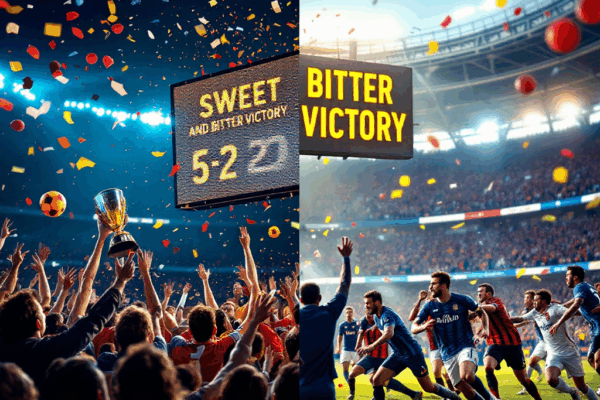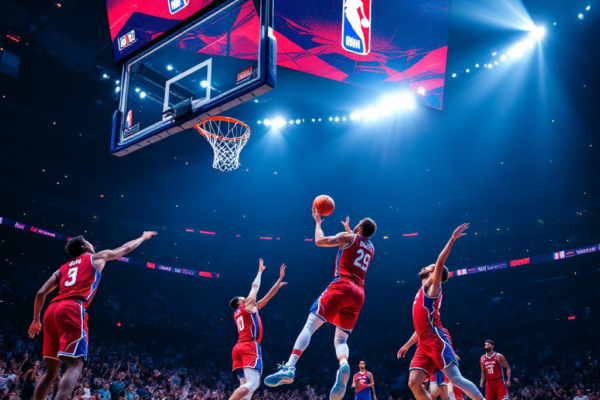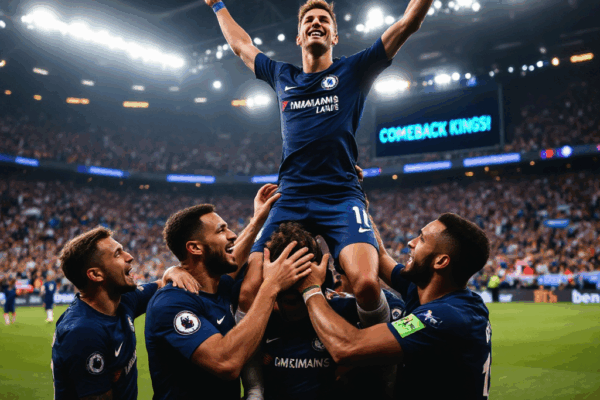A Shocking Defeat Strikes Manchester United
Was Manchester United’s home loss to Wolverhampton truly an Easter miracle gone wrong? In the breath-held silence of 73,819 fans, what led to the downfall of this ‘big club’?
On April 20, 2025, at Old Trafford, the clash between Manchester United and Wolverhampton defied all expectations. Following a dramatic Europa League victory, Man Utd fans anticipated a home win, only to witness a stunning 0-1 defeat.
Coach Ruben Amorim’s decisions became the epicenter of controversy. Right after the Europa League quarterfinal, he rotated five key starters, including Bruno Fernandes and Diogo Dalot. Though a strategic move aimed at the upcoming Europa League semifinals, it ultimately disrupted the team’s balance.
Notably, the lineup featured five players under 20 years old. While academy graduate Tyler Fredrickson’s first-team debut seemed like an investment in the future, their lack of experience was evident throughout the match.
Meanwhile, Wolverhampton extended their winning streak to four. Under Vitor Pereira’s guidance, the Wolves are enjoying their best league performance in 50 years, employing tactics that effectively stifled Man Utd’s attack.
The decisive moment came in the 77th minute when Pablo Sarabia’s free kick sealed the victory for the Wolves, shattering Manchester United’s home unbeaten myth.
This defeat has intensified Man Utd’s battle for a top-four spot. With a Champions League place hanging in the balance, the team must now pin all hopes on winning the Europa League. All eyes are on Manchester United’s next moves.
A Continuum of Variables: The Picture Painted by Manager Amorim’s Choices
A five-man rotation started without Bruno and Dalot, an academy debut that shocked fans! Manchester United missed victory with rookies risking their futures—so where exactly did things begin to falter?
Manager Rúben Amorim’s bold decisions changed Manchester United’s destiny. Following the fierce Europa League quarterfinal clash against Lyon, Amorim executed a daring rotation in league matches. He benched five key starters—including Bruno Fernandes and Diogo Dalot—and handed opportunities to young academy graduates.
This decision carries profound meaning on two fronts. First, it signals a firm commitment to the Europa League. With the Champions League spot hanging in the balance, winning the Europa League was imperative—so Amorim prioritized resting his key players. Second, it’s an investment in the future. By giving first-team experience to academy players like Tyler Fredrickson, he aimed to secure long-term team growth.
Yet, this move ended in a loss to Wolverhampton. Mistakes born of inexperience and a lack of cohesion were glaring, especially as the attack’s efficiency plummeted. Bruno’s absence deeply dented creative passing and scoring chances.
Ultimately, Amorim’s rotation strategy proved a double-edged sword. It created conditions to focus on the Europa League but sabotaged league rank aspirations. This raises serious questions about Manchester United’s strategy as the season advances.
Going forward, Amorim must strike a finer balance between league confrontations and European pursuits. His challenge lies in finding the ideal solution between nurturing young talent and delivering immediate results. Manchester United fans are watching keenly to see how this demanding phase will be overcome.
Wolverhampton’s Revolt: A 50-Year Sprint and Sarabia’s Decisive Strike
The engine of a 4-game winning streak, the league’s best moment! Behind Wolverhampton’s momentum, achieved for the first time in 50 years, was Sarabia’s unpredictable free kick. What’s the tactical secret?
Wolverhampton Wanderers’ 1-0 victory over Manchester United means more than just a win. It showcases the team’s astonishing surge and marks a historic achievement: the club’s best league performance in half a century.
Sarabia’s Decisive Blow
The match-winner was Pablo Sarabia’s free kick. In the 77th minute, his razor-sharp strike shook Manchester United’s net, securing a priceless 3 points for Wolverhampton. Sarabia’s mastery of free kicks has become a powerful weapon for the team, and his impact was unmistakable in this game.
Wolverhampton’s Tactical Evolution
Under the guidance of manager Vítor Pereira, Wolverhampton has undergone a stunning tactical transformation. In this match, especially:
- Rock-solid defense: effectively shutting down Manchester United’s attacks
- Rapid counterattacks: sharp offensive plays centered around Sarabia
- Set-piece mastery: creating decisive scoring opportunities from free kicks
These strategies have been the backbone of Wolverhampton’s 4-game winning streak.
A Record 50 Years in the Making—and Its Meaning
Wolverhampton’s current standing carries a significance beyond mere numbers. It signals a revival for the club and proves their competitiveness in the Premier League. Achieving their best league position in 50 years, Wolverhampton has announced their potential and bright future to the world.
Looking Ahead
This victory presents Wolverhampton with a golden opportunity to completely escape the relegation zone. If they maintain this momentum in the remaining matches, not only can they aim for a mid-table climb, but a push into the top ranks is also within reach. With Sarabia leading the attack and tactical stability sustained, Wolverhampton’s surge is poised to keep rolling.
The Match Decoded by Numbers: Three Defining Moments That Sealed the Outcome
Manchester United’s youthful defense, Wolverhampton’s cohesion, and a single goal that split joy and despair! How did one small mistake on the line change the entire mood of the season? We’ve distilled the essence of this match into three pivotal scenes.
1. Manchester United’s Young Defensive Line, 73.8% Pass Success Rate
Thanks to coach Amorim’s bold decision, Manchester United fielded a young lineup featuring five players under 20. Especially in defense, the average age was just 22.3, exposing a clear lack of experience. Over the entire match, their pass success rate was 73.8%, significantly below the Premier League average of 82%. This failure to cope with Wolverhampton’s pressing led to difficulties in launching attacks.
2. Wolverhampton’s Ironclad Defense, 27 Successful Tackles
Wolverhampton’s defensive organization shone brightly. Their 27 successful tackles marked the team’s highest tally this season. Central defenders Kilman and Dawson stood out, combining for 15 tackles and 8 interceptions that completely neutralized Manchester United’s offense. This was the very embodiment of the teamwork that fueled Wolverhampton’s recent four-game winning streak.
3. Sarabia’s 77th-Minute Match-Winning Goal: The Magic of 0.1 Seconds
The match’s fate was sealed by Sarabia’s free-kick goal in the 77th minute. The goalkeeper was only 22 meters away, and the ball crossed the goal line in a blink—just 0.1 seconds. That single strike transformed both teams’ seasons. Manchester United dropped out of the top-four race, while Wolverhampton took a giant leap away from the relegation zone.
These three moments vividly show the vital importance of experience, teamwork, and a touch of magic in football. While young United players gained priceless experience, Wolverhampton secured crucial three points toward their best finish in 50 years. This match was a powerful reminder that in football, an entire season’s fate can turn on one game—or even just 0.1 seconds.
A Decisive Move for the Future: Europa League or Premier League?
Now, only a choice remains. Manchester United has turned their focus to the Europa League, while Wolves have effectively escaped the relegation zone. How will the next move shape the fate of these two teams?
Manchester United and Wolverhampton Wanderers both stand at a crucial crossroads. For Man United, winning the Europa League is the only hope for Champions League qualification. Having fallen behind in the Premier League’s top-four race due to poor form, they must put everything on the line in the Europa League semi-final against Bilbao.
Ruben Amorim’s strategy seems clear. In the Premier League, he will rotate his key players to conserve their energy and concentrate all resources on the Europa League. It’s a high-risk approach, but under the circumstances, it may be an unavoidable choice for Man United.
On the other hand, Wolves are on the verge of their best finish in 50 years. Under the guidance of Vítor Pereira, they have strung together four consecutive wins, climbing out of the relegation zone and now have their sights set on an even higher position. Wolves’ next goal is clear: give their all in the remaining matches to secure the club’s highest-ever league finish.
The tactical choices made by these two teams will significantly impact their upcoming schedules. Man United will aim to secure a Champions League spot through Europa League success, while Wolves will strive to build on their upward momentum in the league and enhance their team’s value.
Ultimately, the success or failure of this season hinges on this decisive move. Will Man United’s Europa League-focused strategy pay off, or will Wolves’ steady rise in league performance steal the spotlight? Fans are all eyes as a thrilling showdown unfolds until season’s end, making it impossible to look away.




